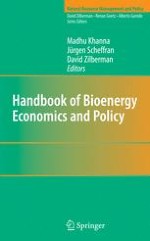2010 | OriginalPaper | Buchkapitel
14. Market and Social Welfare Effects of the Renewable Fuels Standard
verfasst von : Amy W. Ando, Madhu Khanna, Farzad Taheripour
Erschienen in: Handbook of Bioenergy Economics and Policy
Verlag: Springer New York
Aktivieren Sie unsere intelligente Suche, um passende Fachinhalte oder Patente zu finden.
Wählen Sie Textabschnitte aus um mit Künstlicher Intelligenz passenden Patente zu finden. powered by
Markieren Sie Textabschnitte, um KI-gestützt weitere passende Inhalte zu finden. powered by
